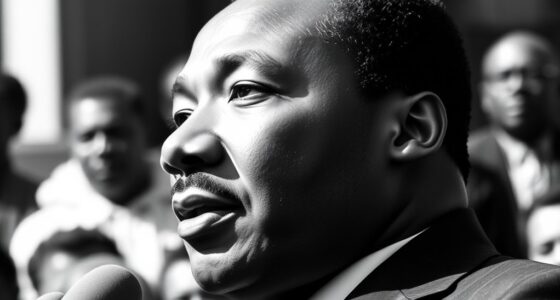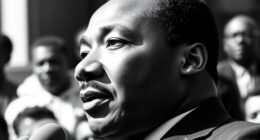Malcolm X’s quotes pack a powerful punch, inspiring you to embrace change and challenge injustice. His words emphasize self-empowerment with statements like, “Education is the passport to the future,” urging you to take control of your destiny. He believed that growth comes through adversity, famously stating, “Stumbling isn’t falling.” By advocating unity and resilience, he calls for collective action against oppression. His legacy encourages you to reflect on your identity and aim for personal advancement. As you explore more of his impactful sayings, you’ll discover deeper insights that ignite your passion for change.
Key Takeaways
- “Education is the passport to the future” emphasizes the necessity of self-preparation for personal and collective advancement.
- “Power never takes a back step – only in the face of more power” highlights the importance of strength in the struggle for justice.
- “We can’t think of uniting with others until we’ve first united among ourselves” advocates for internal solidarity as a foundation for collective action.
- “Stumbling isn’t falling” encourages resilience, viewing setbacks as opportunities for growth and learning.
- “We can’t think of being acceptable to others until we’ve first proven acceptable to ourselves” stresses the importance of self-acceptance and empowerment.
Introduction
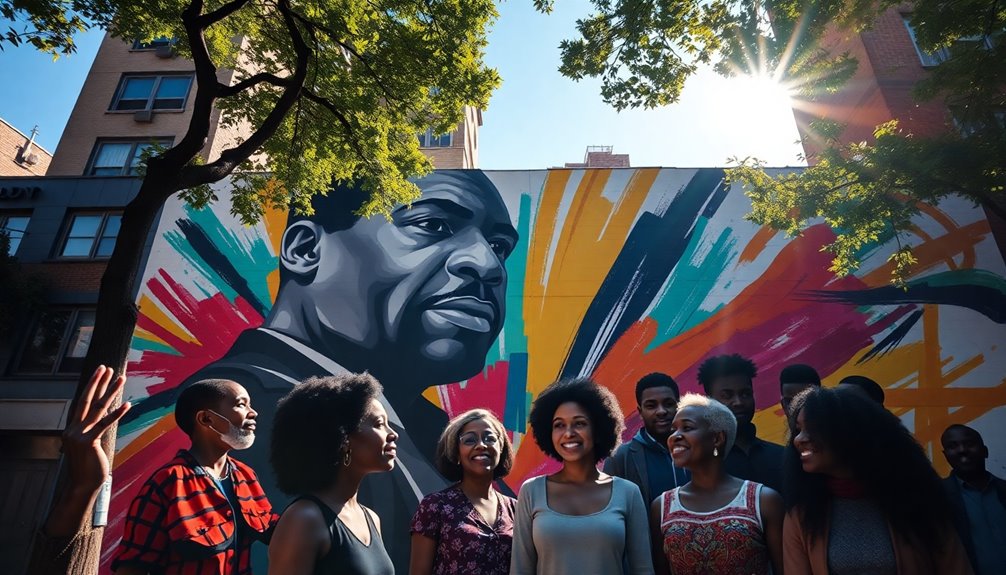
When you think about influential figures in the fight for racial justice, Malcolm X certainly stands out. Born Malcolm Little in 1925, his early life was marked by tragedy and instability, shaping his fierce commitment to activism. After serving time in prison, he found a new purpose within the Nation of Islam, quickly rising to prominence as a powerful spokesman. His advocacy for Black empowerment and criticism of non-violence in the civil rights movement distinguished him from contemporaries. His experience of being incarcerated served as a turning point that ultimately led him to embrace activism and leadership.
As he navigated his evolving beliefs, he became a symbol of courage and resilience. Malcolm X’s legacy continues to resonate, inspiring countless individuals to pursue justice and empowerment through his bold statements and unwavering dedication to change.
The Essence of Activism in Quotes
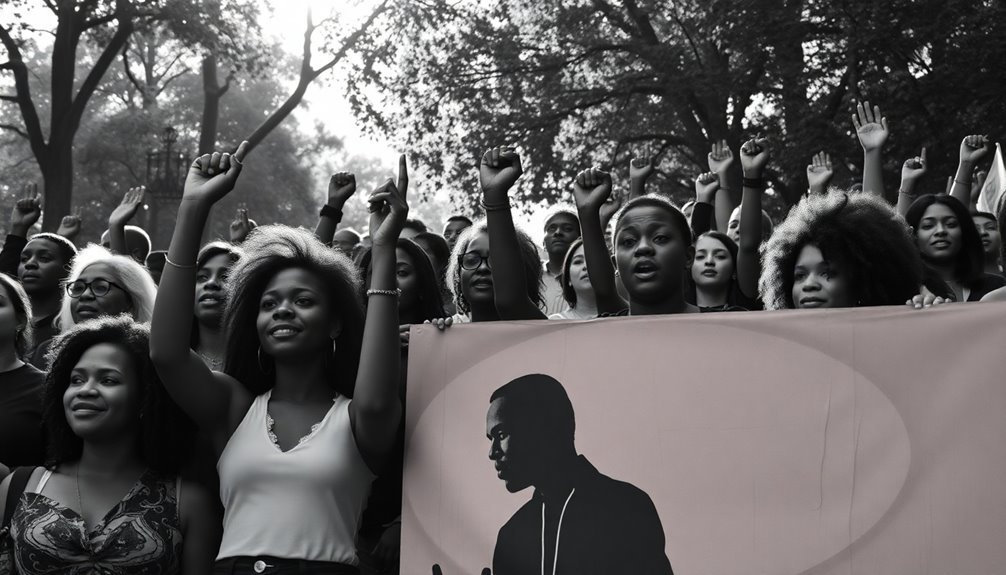
As you explore the essence of activism, Malcolm X’s quotes reveal profound insights into self-empowerment, education, and resistance. He emphasizes self-reliance, urging you to take control of your life and destiny.
“We can’t think of being acceptable to others until we’ve first proven acceptable to ourselves,” he asserts. Education is essential, serving as the “passport to the future,” preparing you for the challenges ahead. Lifelong learning fosters curiosity and understanding, allowing individuals to navigate the complexities of the world.
Malcolm stresses the importance of power and resistance, stating, “Power never takes a back step – only in the face of more power.” He critiques systemic injustice, reminding you that mere presence doesn’t equate to acceptance.
His words inspire a commitment to fighting for rights and achieving true freedom through collective action.
Malcolm X Quotes: Bold Statements That Inspire Change
Malcolm X remains an enduring symbol of courage, conviction, and the relentless pursuit of justice. His bold statements challenged societal norms, empowered marginalized voices, and continue to inspire those who seek meaningful change. These quotes capture his unwavering commitment to freedom, equality, and self-determination, serving as a powerful call to action for social transformation.
On Freedom and Self-Determination
• “If you’re not ready to die for it, put the word ‘freedom’ out of your vocabulary.”
• “You can’t separate peace from freedom because no one can be at peace unless he has his freedom.”
• “We declare our right on this earth…to be a human being, to be respected as a human being.”
Context:
Malcolm X’s words on freedom and self-determination underscore the indispensable link between liberty and human dignity. These quotes challenge us to recognize that true peace is unattainable without freedom, and they emphasize the importance of standing firm in the pursuit of our rights. His unapologetic demand for respect and equality continues to inspire courage in the face of oppression.
On Justice and Equality
• “I’m for truth, no matter who tells it. I’m for justice, no matter who it’s for or against.”
• “You can’t separate peace from freedom because no one can be at peace unless he has his freedom.”
• “The most disrespected person in America is the Black woman. The most unprotected person in America is the Black woman. The most abused person in America is the Black woman.”
Context:
These statements reflect Malcolm X’s deep commitment to justice and equality for all, particularly marginalized communities. His insistence on truth and fairness challenges us to confront systemic biases and work tirelessly to ensure that every individual is treated with dignity and respect. His words remind us that fighting for equality requires acknowledging uncomfortable truths and taking decisive action.
On Education and Empowerment
• “Education is the passport to the future, for tomorrow belongs to those who prepare for it today.”
• “A man who stands for nothing will fall for anything.”
• “Don’t be in a hurry to condemn because he doesn’t do what you do or think as you think or as fast.”
Context:
Malcolm X believed that education was a critical tool for empowerment and societal change. These quotes highlight the transformative power of learning, critical thinking, and self-awareness. By advocating for education and cautioning against blind condemnation, he encourages us to seek knowledge, understand diverse perspectives, and stand firm in our values as a foundation for personal and collective progress.
On Activism and Resilience
• “The future belongs to those who prepare for it today.”
• “A man who stands for nothing will fall for anything.”
• “Don’t be afraid to take a big step if one is indicated. You can’t cross a chasm in two small jumps.”
Context:
Malcolm X’s perspective on activism and resilience calls for bold action and steadfast commitment in the face of adversity. He emphasizes the importance of preparation, conviction, and the courage to take decisive steps toward change. His insights motivate individuals to remain resilient and proactive, understanding that meaningful progress often demands bravery and unwavering resolve.
Overall Summary
Malcolm X’s quotes resonate with a timeless call for justice, empowerment, and fearless advocacy for change. His bold statements challenge us to reflect on our values, confront injustices, and actively work toward a more equitable world. By embracing his powerful insights on freedom, education, and resilience, we are reminded of the enduring impact of standing up for what is right and the transformative power of unyielding conviction.
Memorable Sayings and Interpretations

Malcolm X’s memorable sayings resonate deeply, offering powerful interpretations that challenge and inspire. When he declares, “Education is the passport to the future,” he emphasizes your responsibility to prepare for tomorrow. He insists that without education, you’re going nowhere, highlighting its essential role in self-improvement. Malcolm X was a renowned civil rights activist who believed in the transformative power of education for empowerment.
His belief that “stumbling isn’t falling” encourages resilience, reminding you that setbacks are part of growth. Furthermore, his call for unity underscores the importance of solidarity, stating, “We can’t think of uniting with others until we’ve first united among ourselves.”
Confronting oppression, he warns against societal narratives that mislead you into hating the oppressed. These sayings collectively urge you to seek knowledge, embrace resilience, and foster unity for meaningful change.
Unexpectedly Profound Insights

While many of Malcolm X’s insights might seem straightforward, they often reveal deeper truths about adversity, identity, and societal structures.
You’ll find that his perspective on adversity emphasizes growth, as he noted that every defeat carries a lesson for improvement. He championed education as essential for advancement, urging you to recognize its value in your journey.
Malcolm also viewed prison as a unique opportunity for reflection and personal transformation, suggesting that true change can arise from hitting rock bottom. His belief in self-defense and equality pushes you to advocate for social justice actively, particularly as he transformed his life during his time in incarceration.
Ultimately, his insights challenge you to embrace self-love and cultural pride, reminding you that empowerment begins with understanding your identity and history.
Inspire Personal Reflection Daily
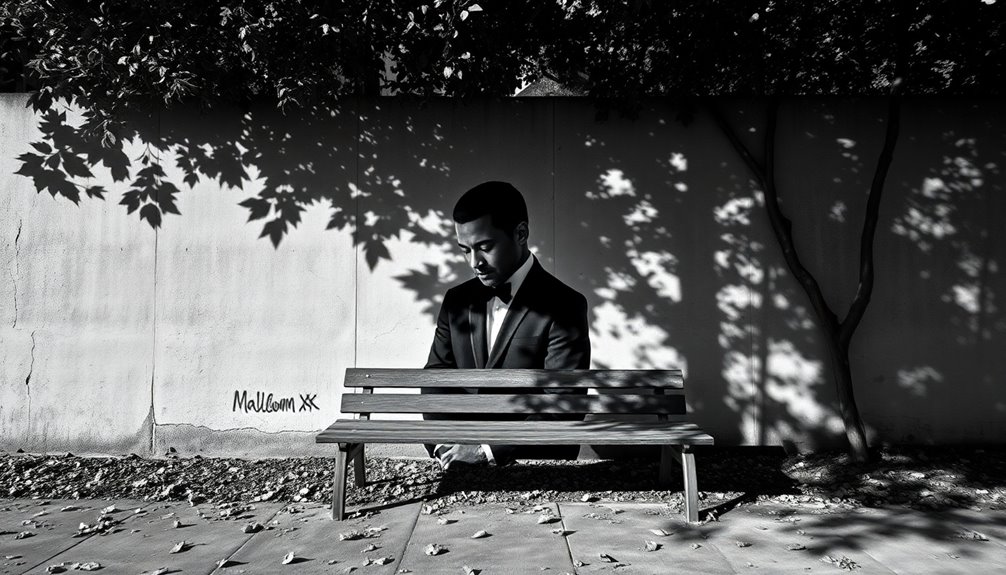
Daily reflection can ignite personal growth and understanding, allowing you to integrate the profound insights gained from past experiences.
Each setback, heartbreak, or loss holds a lesson that can enhance your performance next time. Remember, you’ve grown from a place of ignorance to knowledge, and that patience is key. Setting goals provides a clear direction and purpose in your journey, guiding you through life’s challenges.
Education fuels your journey; immerse yourself in books, satisfying your curiosity. Embrace resilience; stumbling is just part of the process.
Make noise for change and stand firm in your beliefs, knowing that action is essential.
As you reflect, cultivate self-identity and cultural pride. Acknowledge your worth first, and let that foundation guide you toward understanding yourself and the world around you.
Embrace daily reflection for a richer, more empowered life.
Enduring Impact of Words

Words hold immense power, capable of shaping thoughts, inspiring movements, and igniting change. Malcolm X’s quotes resonate deeply, especially in social justice. When he emphasized self-defense against oppression, he urged you to stand firm. His insight into systemic issues faced by the Black community calls you to confront self-doubt and embrace self-worth. He highlighted the importance of unity, reminding you that collective strength precedes broader alliances. Furthermore, his critiques of media manipulation challenge you to question narratives and recognize who benefits from division. Education, he believed, is transformative, pushing you toward continuous learning and self-improvement. Continuous self-improvement is vital for overcoming life’s challenges and achieving personal success. In the process of advocating for change, it is essential to embrace ethical considerations to ensure fairness and accountability in your actions. Ultimately, his words compel you to reflect on history, societal structures, and your role in advocating for change.
Legacy of Empowering Words
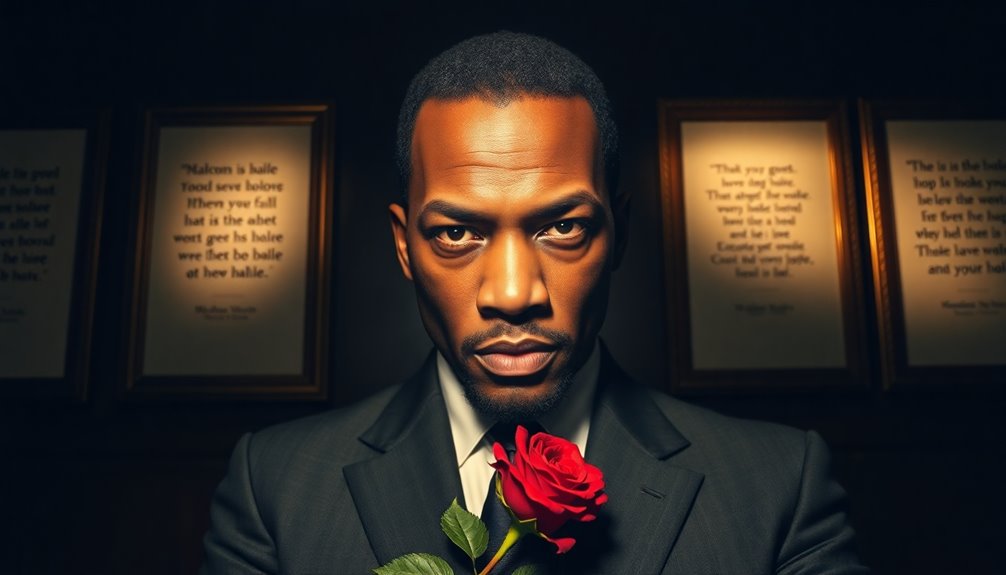
As you explore Malcolm X’s legacy, you’ll find that his empowering words continue to inspire individuals to seek education and self-reliance. He believed education is essential for progress, famously stating, “Without education, you’re not going anywhere in this world.” His emphasis on self-education highlights the importance of reading and curiosity as tools for personal growth. Malcolm X also advocated for self-reliance, asserting that freedom must be self-achieved. He taught that no one can give you freedom; you have to take it. His critique of societal injustice urges you to recognize the dangers of media manipulation and division. Ultimately, he called for collective action and unity among oppressed groups, reminding you that true change comes from anger and determination. This call for unity is echoed in his Message to the Grassroots, where he emphasizes the need for solidarity among Black Americans in their fight against oppression.
Frequently Asked Questions
What Was Malcolm X’s Early Life Like Before Activism?
Malcolm X’s early life was marked by instability and trauma. Born into a family that faced constant threats from white supremacists, you’d see his father murdered and his mother institutionalized.
As a child, you’d experience racism firsthand, leading to a disheartening school experience. Dropping out at just 15, you’d find yourself in foster care and engaging in petty crimes, all shaping the man who’d eventually become a powerful activist.
How Did Malcolm X’s Views Evolve Over Time?
Malcolm X’s views evolved considerably throughout his life.
Initially, you see him advocating for black separatism through the Nation of Islam, believing in a distinct identity for African Americans.
However, after his pilgrimage to Mecca, he shifted towards a more inclusive perspective, embracing a universal approach to Islam and civil rights.
His later work emphasized political engagement, global solidarity, and unity among all races, reflecting a deeper understanding of the struggle for equality.
What Were Malcolm X’s Key Influences and Mentors?
Malcolm X’s key influences and mentors shaped his ideology considerably. You see his parents instilled black nationalist sentiments early on.
In prison, he encountered John Bembry, sparking his love for reading and critical thinking.
Women like Ella Collins and Victoria Garvin guided him with their insights and activism.
Finally, figures like Elijah Muhammad and Marcus Garvey further molded his beliefs, driving his evolution into a powerful voice for black empowerment and justice.
How Did Malcolm X’s Assassination Affect the Civil Rights Movement?
Malcolm X’s assassination sent shockwaves through the civil rights movement, heightening racial tensions across America.
You’d see protests erupt as communities expressed outrage, viewing his death as an attack on their struggle.
This event shifted the movement’s focus toward Black nationalism and self-determination, inspiring a new wave of activists.
You’d also notice increased radicalization, as groups like the Black Panthers emerged, galvanizing people to continue the fight for racial equality.
Are There Any Documentaries About Malcolm X’s Life and Impact?
Yes, there are several documentaries about Malcolm X’s life and impact.
You can explore “Malcolm X: Make It Plain,” which covers his rise and legacy, or “Who Killed Malcolm X?” that investigates his assassination.
“Blood Brothers: Malcolm X & Muhammad Ali” highlights their friendship, while “Malcolm X: A Search for Identity” probes into his transformative journey.
These films provide valuable insights into his contributions to civil rights and social justice.






